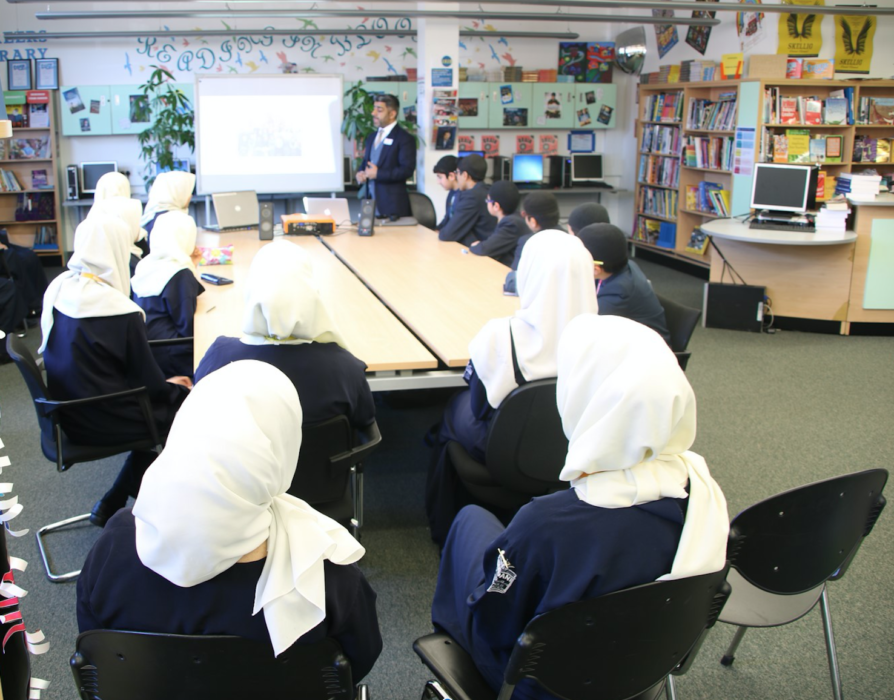Last week I had the pleasure to visit Leicester, one of the most diverse places in the UK and home to the UK Premier League champions! I was there to spend time at an Islamic faith school to share my reflections with 14-16 year old young Muslims about my journey to the UK as a child refugee, life in the FCO and hopefully inspire future British diplomats!
Truth be told I was slightly apprehensive about visiting a faith school, as I knew very little about what goes on and what to expect. However, in the current climate where issues around identity, faith and British values are rightly being ventilated, Islamic faith schools were exactly the sort of places where dialogue and cultural bridges needed to be nourished more than ever. This would help ensure that the next young generation of British Muslims can continue to contribute to our society like so many others had done before.
I was also inspired by the outreach campaign the Office has been encouraging. I felt it important to challenge any misconceptions that may persist about the FCO and what a British diplomat looks like.
The School, part of the Madani Federation, is an Islamic faith school where boys and girls and taught under one campus, albeit in separate classes. As you walk down the corridors it is natural to see the work of children plastered across the walls. Look more closely, and you will see discussion around British values and tolerance, interwoven with verses from the Qu’ran. My visit coincided with the Zuhr (afternoon) prayer and as such most of the classes were empty as the students were in the school mosque praying. A few young girls who were unable to pray were also in the corridor wondering around with small paper signs affixed on their hijabs. On closer inspection, they were re-enacting the dynamics between protons and neutrons, each paper sign with a description of how their respective atomic particle should act. We joked that I would have enjoyed GCSE science much more had there been a similar interactive approach!
As with previous visits to schools, this proved to be a thoroughly rewarding experience. At the School I talked about my journey to the UK, the welcome I had received and the enormous sense of pride I had in representing my country. The student’ questions revealed their sense of insecurity around issues of identity, but on the other hand reaffirmed the commonality of challenges young people face irrespective of backgrounds. I reflected on how questions around belonging are natural. I added that the allure of ‘imposter syndrome’ – a feeling of not fitting it – whilst easy to fall victim to, was fundamentally at odds with what modern Britain stood for.
During question and answer session with the students, I was bombarded with a wide range of questions: including: favourite countries I have visited, how do you join the foreign office, how much do diplomats get paid (!), what it was like to learn English when I arrived. The most remarkable question posed to me, and which frankly I didn’t feel fully qualified to answer, was from a young girl who asked whether ‘patriarchy’ posed a particular challenge for young Muslim women in their career aspirations. I noted that I personally knew Muslim women in the office which was positive. With the caveat that I couldn’t speak on behalf of those who felt subjects of a ‘patriarchal system’, I noted that with the opportunities available in the UK it was important for her and her classmates to not impose any limits on their ambitions.
I then received a presentation from a group of young boys who were developing an idea to combat extremism and provide a counter-narrative to some of the negative views about Muslims. Their idea included a road-show across the country where people would record videos about what they thought on specific issues and the videos would be uploaded with the aim of encouraging debate and collaboration between opposing views. It was a wonderful initiative and the presentation included a very swanky YouTube video which highlighted the high-tech backgrounds many of these young students were immersed in.
The visit helped to challenge some of the misconceptions I had. I also hope it will have reaffirmed to many of the students that British values are real and each and every one of them has the opportunity to realise their aspirations irrespective of their faith, race or how they dress.
The importance of such outreach cannot be understated. It’s a reminder that our liberal values are only as strong as the base upon which we build our foundations.

